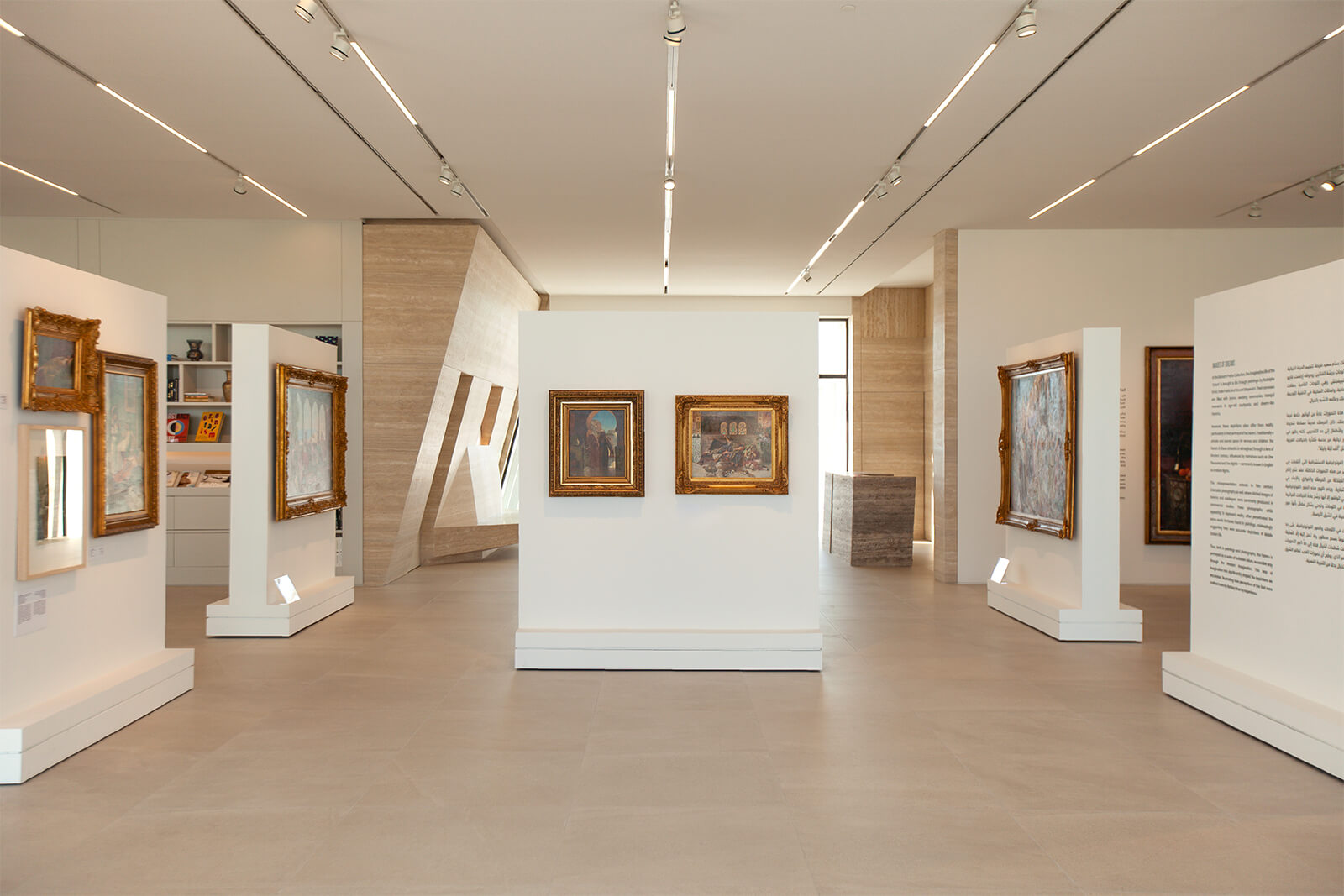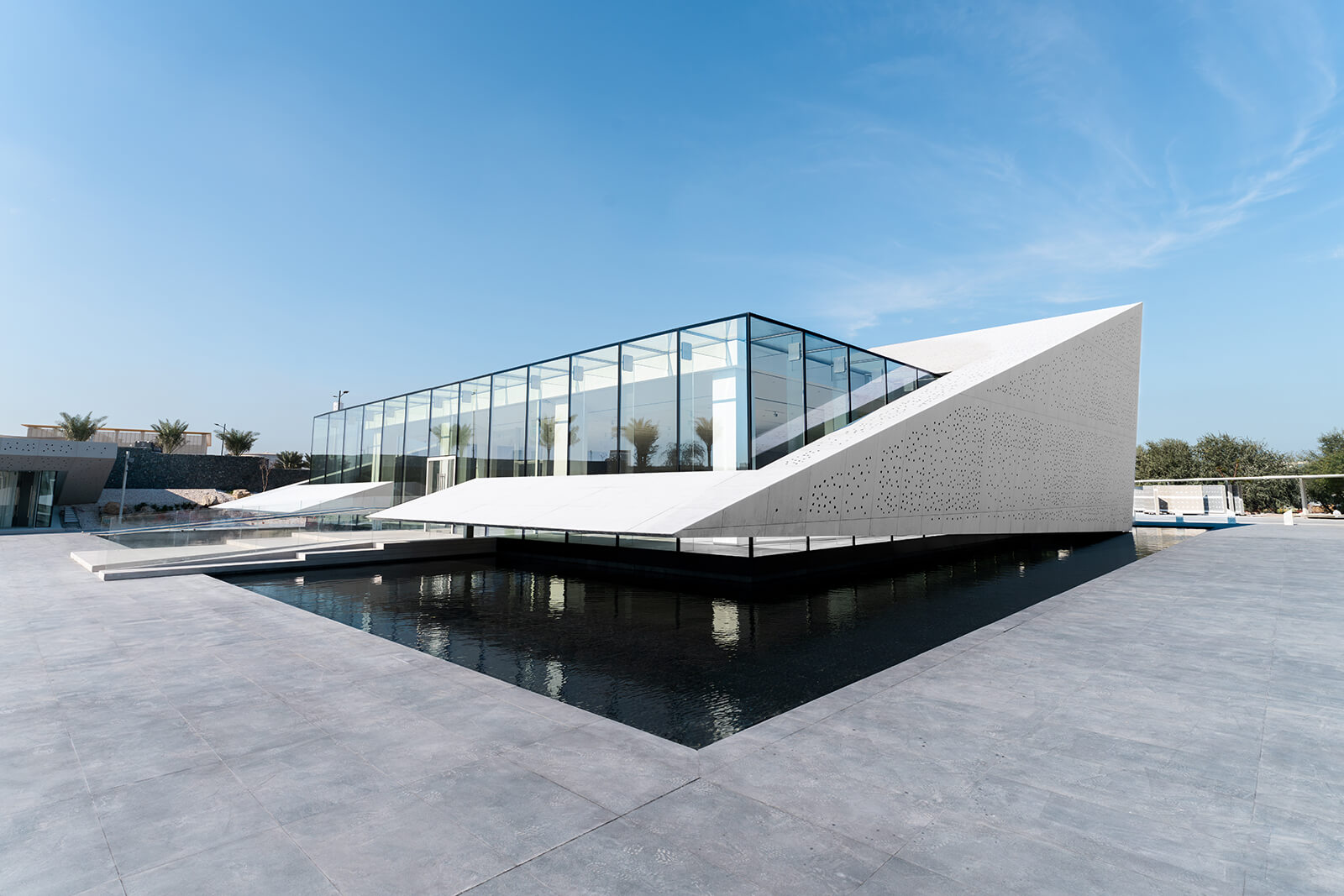Jacopo Benassi’s Libero! is a punk-infused rebellion against images
by Hili PerlsonAug 25, 2025
•make your fridays matter with a well-read weekend
by Rémy JarryPublished on : May 07, 2024
Inaugurated on March 2, 2024, the Bassam Freiha Art Foundation (BFAF) is the first private art foundation on Saadiyat Island, though not in the Emirate of Abu Dhabi, already home to several private art institutions, such as the Abu Dhabi Music & Arts Foundation (ADMAF), founded in 1996 by Huda I. Alkhamis-Kanoo.

Located in the vicinity of the Louvre Abu Dhabi and the upcoming Guggenheim Abu Dhabi and Zayed National Museum, the foundation contextualises Orientalist paintings, a genre often misunderstood as it mirrors a complex and evolving cultural dialogue between the Orient and the Occident. With a total exhibition space of about 600 square metres, the new foundation may appear small by Emirati standards but is also surrounded by a garden displaying sculptures by modern artists.
Entitled Echoes of the Orient (March 4 - August 15, 2024), the inaugural exhibition focuses on arts patron Bassam S. Freiha’s personal collection, amassed since the 1970s. Born in Beirut in 1939, Freiha accumulated his wealth by taking over the pan-Arab press group Dar Assayad, founded by his father in 1943, developing it until the 2010s. Freiha has also been active in philanthropy in the region and distinguished himself with his diplomatic expertise, notably serving Lebanon and UNESCO.
His collection draws on his expertise as the co-founder, with Brian MacDermot (1930-2013), of Mathaf, the first gallery dedicated to the Orientalist movement in London, established in 1976. Thus, we discover the collector's taste for the work of European painters such as Fabio Fabbi (1861-1946), Léon Comerre (1850-1916), Rudolf Ernst (1854-1932), Paul Leroy (1860-1942), Jan-Baptist Huysmans (1826 -1906), and Maguelonne Lefebvre-Glaize (1839-1919), one of the few female Orientalist painters. Though not as famous as the biggest stars of the Orientalist movement, like Eugène Delacroix, Jean-Léon Gérôme, or Lawrence Alma-Tadema, they remain eminent representatives.
Curated by Michaela Watrelot, Director of the Foundation, the originality of the exhibition is twofold: first, its integration of 19th-century Orientalist photographs and second, its juxtaposition with the works of Arab modernist painters. Sourced from the collection of American photojournalist and collector Norbert Schiller, reproductions of original albumen prints by Orientalist photographers Gabriel Lékégian (1853-1920), Tancrède Dumas (1830-1905), and Jean Pascal Sébah (1872-1947) offer an intriguing mise-en-abîme. According to Watrelot, “The photographs act as a visual bridge between the Orientalist fantasies captured in the paintings and the realities as viewed through the stylised lens of Western photographers.” Emphasised by the contrast between the black-and-white photographs and the colourful canvases, this critical distance towards the romanticisation of the Orient is rooted not only in the legacy of Edward Said (1935-2003) but also in that of art historian Linda Nochlin (1931-2007). In this regard, Watrelot has also focused on the representation of Oriental women in both painting and photography from the colonial era. Displayed in the Foundation’s annex gallery, this curatorial provocation extends to the contemporary section, partly dedicated to Sama Alshaibi’s photographic series Carry Over, in which the artist delves into the “exoticised representations of Arab women in historical images”, explains Watrelot, aiming to reclaim the narratives of the Orientalist Movement.
This demystification continues through a dialogue with Arab modernist painters, especially Habib Srour (1860-1938), César Gemayel (1898-1958), and Moustafa Faroukh (1901-1957) from Lebanon, as well as Tawfik Tarek (1875-1940) from Syria. Exhibited alongside the works of Western Orientalists, in genres ranging from portraits to landscapes, we note the importance of artists from the Levant, with a significant portion of the works on view loaned from the collection of Saleh Barakat’s gallery in Beirut.
This Lebanese connection is also evident in the architecture of the building itself. Bassam Freiha commissioned Rasha Gebran, a Beirut-born architect based in Abu Dhabi, to design it. “The architectural design of the Bassam Freiha Art Foundation is a profound embodiment of the founder’s character, envisioned to reflect his towering presence, wisdom, and the mosaic of his achievements…As one progresses through the building, the transition from solid structures to varied perforations narrates the story of the founder’s diverse accomplishments and the impact of his journey on the world. This gradual transformation culminates in a clear glass enclosure, a metaphor for transparency and introspection, offering a glimpse into the core of the founder’s vision and values,” Gebran said to STIR, describing how the structure distinguishes itself from its formidable neighbours, including the Louvre Abu Dhabi and the upcoming Zayed National Museum.
Its minimalist and geometric features, emphasising horizontality and transparency, depart from Orientalising stereotypes. This Lebanese imprint in Abu Dhabi also exemplifies the shift in artistic and cultural vibrancy from the Levant to the Gulf, accentuated by the chronic instability in the region. Elaborating on the aesthetic, particularly its sense of visual lightness, Gebran said to STIR, “The surrounding water feature adds a dimension of tranquility and reflection, both literally and metaphorically. It mirrors the foundation’s structure, doubling the visual impact of its sharp angles and dynamic perforations, and symbolizing the reflective journey of art and culture the foundation promotes. ...The interplay between water and structure, light and shadow, solidity and transparency, encapsulates the foundation’s mission to be a space of inspiration, contemplation, and cultural dialogue, truly setting a distinctive architectural brand in the global art scene.”

Interestingly, other Gulf countries, including Qatar, are also reconsidering Orientalism, as evidenced by the Lusail Museum project dedicated to this topic. According to Watrelot, both institutions “share a commitment to re-examining Orientalist art […] while the Lusail Museum's collection is set to provoke a reconsideration of Arab identity and the 19th century power structures”.
After its inaugural art exhibition, BFAF’s main exhibition hall will permanently showcase highlights from Freiha’s collection, alongside rotating exhibitions from other private collections. The annex gallery will focus on exhibiting regional and local artists. Strategically situated at the corner of Manarat Al Saadiyat, the exhibition centre where the Abu Dhabi Art Fair is organised annually, among other cultural events, the foundation will be able to integrate more deeply into the Emirati cultural ecosystem.
With inputs from STIR.by Mrinmayee Bhoot Oct 06, 2025
An exhibition at the Museum of Contemporary Art delves into the clandestine spaces for queer expression around the city of Chicago, revealing the joyful and disruptive nature of occupation.
by Ranjana Dave Oct 03, 2025
Bridging a museum collection and contemporary works, curators Sam Bardaouil and Till Fellrath treat ‘yearning’ as a continuum in their plans for the 2025 Taipei Biennial.
by Srishti Ojha Sep 30, 2025
Fundación La Nave Salinas in Ibiza celebrates its 10th anniversary with an exhibition of newly commissioned contemporary still-life paintings by American artist, Pedro Pedro.
by Deeksha Nath Sep 29, 2025
An exhibition at the Barbican Centre places the 20th century Swiss sculptor in dialogue with the British-Palestinian artist, exploring how displacement, surveillance and violence shape bodies and spaces.
 surprise me!
surprise me!
make your fridays matter
SUBSCRIBEEnter your details to sign in
Don’t have an account?
Sign upOr you can sign in with
a single account for all
STIR platforms
All your bookmarks will be available across all your devices.
Stay STIRred
Already have an account?
Sign inOr you can sign up with
Tap on things that interests you.
Select the Conversation Category you would like to watch
Please enter your details and click submit.
Enter the 6-digit code sent at
Verification link sent to check your inbox or spam folder to complete sign up process



by Rémy Jarry | Published on : May 07, 2024
What do you think?